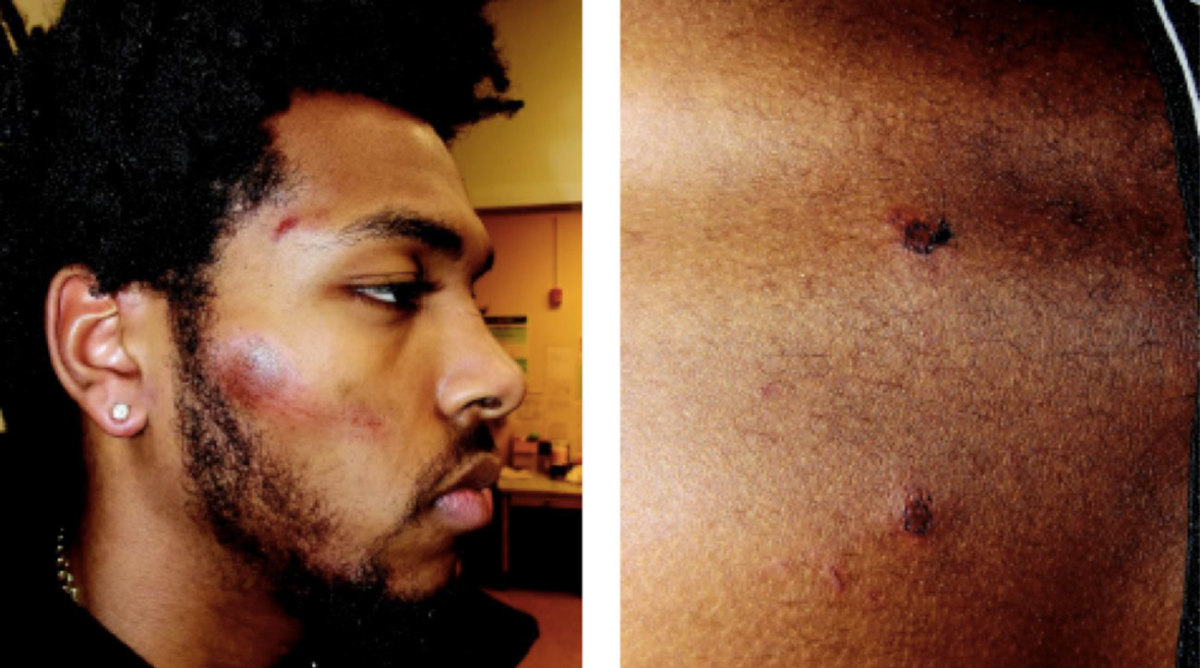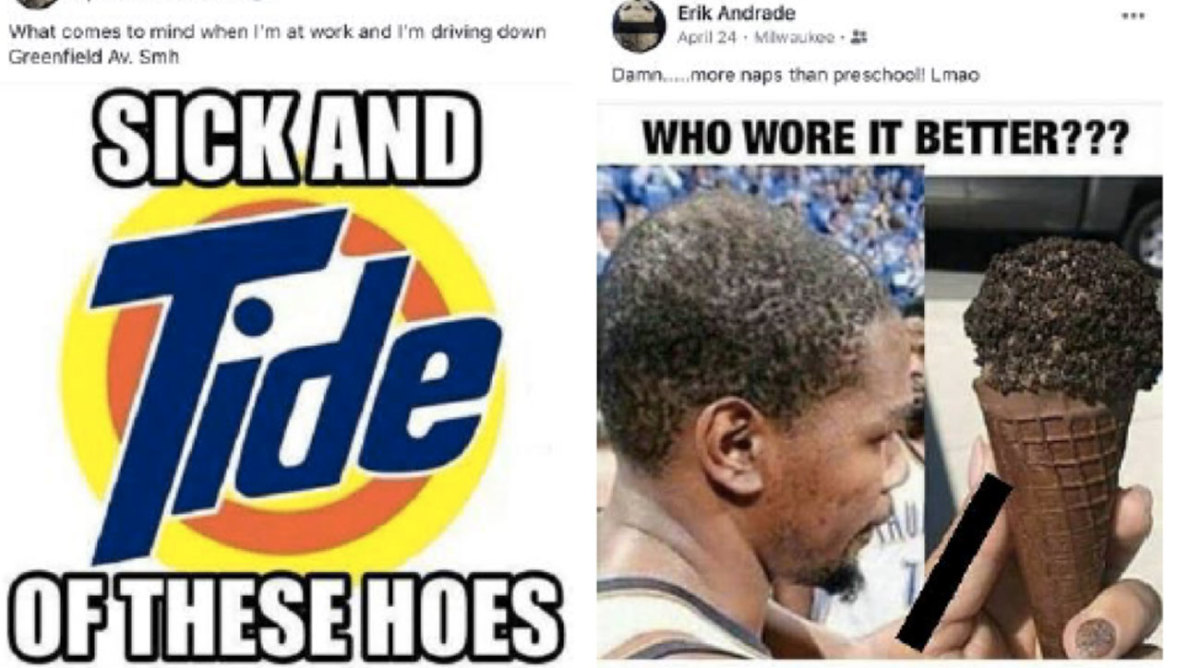Inside Sterling Brown’s Compelling Lawsuit Against Milwaukee and City's Police Department

In a move that will intensify the national discussion on the treatment of African-Americans by law enforcement, Milwaukee Bucks guard Sterling Brown on Tuesday filed a federal civil rights lawsuit against the City of Milwaukee, the chief of the Milwaukee Police Department (MPD) and eight MPD sergeants and officers. The complaint, which SI has obtained and which will be litigated in the U.S. District Court for the Eastern District of Wisconsin, raises serious claims about the treatment of Brown and other African-American men by Milwaukee law enforcement. Brown charges that the defendants violated his civil and constitutional rights as an American citizen and applied excessive and brutal force while unlawfully arresting him on a misdemeanor charge.
A disputed arrest on a cold January morning in Milwaukee
Brown’s lawsuit stems from the highly controversial circumstances of an incident that occurred in a Walgreens parking lot at 2 a.m. on Friday, Jan. 26. It was a chilly morning, with a temperature of around 26 degrees Fahrenheit. The 23-year-old Brown, a Bucks rookie at the time, had parked his loaned Mercedes-Benz horizontally—and illegally—across two handicap spaces in the Walgreens lot. Not surprisingly, the store’s parking lot was mostly empty at that early hour—a fact that made Brown’s slapdash parking especially noticeable to witnesses.
Milwaukee police officer Robert Grams observed Brown’s unoccupied vehicle while Brown was inside the Walgreens. Grams then pulled his police sergeant wagon over, parked and waited to see if the customer who had parked illegally would exit the store. When Brown left the store a few minutes later and began to walk back to his car, Grams walked over to Brown and positioned himself between Brown and the driver’s side door.
It’s worth taking a breather here and taking stock of the situation. Brown’s attorneys, Mark Thomsen and Scott Thompson, stress that Brown had not committed a crime. Parking in a handicapped spot, though unlawful and morally objectionable, does not constitute a criminal act. Brown would later receive a $200 ticket for his parking violation; there is no argument from Brown or his attorneys that he didn’t deserve the ticket.
The problem, from Brown’s perspective, is pretty much everything else that happened from this point on. Officer Grams’s Body Worn Video Camera (BWVC) captured much of what then transpired. With that in mind, Brown’s attorneys note that according to MPD’s own standard operating procedures, Brown’s encounter with Grams should have been brief, uneventful and concluded with Grams writing a parking citation and going about his way. Indeed, when an MPD police officer speaks with a driver about violating a traffic law, “the driver may only be asked questions reasonably related to the nature of the traffic violation. Absent an articulable suspicion that the driver has committed or is about to commit a crime, no further questions are allowed and all questions must bear a reasonable relationship to the traffic violation at issue.”
Brown’s attorneys claim that instead of simply issuing Brown a ticket, Grams confronted Brown in an aggressive and racially insensitive manner. Grams, they say, also failed to identify himself as a police officer as required by Wisconsin law. The attorneys insist that Grams “demanded that Mr. Brown produce a driver’s license and then yelled at Mr. Brown to back away from his own car.” About 10 seconds later, Grams is accused of “unlawfully [shoving]” Brown. At least as depicted by Brown’s attorneys, Brown did not resist or fight back. Inexplicably, Grams then called dispatch for backup.
The encounter quickly turned more combative. Grams yelled at Brown to “back up,” which Brown’s attorneys argue was for no apparent reason other than to intimidate Brown. Grams, according to the attorneys, also ominously warned Brown that, “I’ll do what I want, alright? I own this right here,”—an admonition that prompted Brown to reply, “You don’t own me.”
As depicted in Brown’s complaint, Grams’s BWVC captured the following sequence of comments between Brown and Grams. Notice how Grams seems to give Brown a hard time and uses words that some would regard as coded racist terminology:
Grams: What’s your name—what’s your name?
Brown: It’s on there, Sterling Brown.
Grams: I’m asking you.
Brown: I’m telling you, Sterling Brown.
Grams: These are simple questions, man.
Brown: No, I’m answering them. I ain’t got no problems, but you’re touching me.
Grams: These are simple questions, and you’re being—and you’re being like—and you’re being all badass to me, alright?
Brown: I am not, but you touched me.
Grams: I asked you a question so I could verify this okay – you don’t think I see these that are – whatever – fake, so I’m asking your name.
Within a handful of minutes, several additional police cars arrived “at the scene of this parking violation matter.” Soon six police officers surrounded Brown as he stood next to his car. Two of the officers noticed that in the backseat of Brown’s car were paper targets that had bullet holes in them. They asked the unarmed Brown if he had a gun, and Brown said no. Officers then requested that Brown take his hands out of his pocket. Keep in mind, minutes earlier Brown had (with the officers watching) put his hands into his pocket to deactivate his car alarm and then took his hands out of his pockets—a move that implied that the small object in Brown’s pocket was not a gun or weapon, but merely a key fob.
At this point the encounter turned hurtful. Officer Bojan Samardzic reportedly pulled out his pistol, which was followed by another officer grabbing Brown’s left arm and still another kneeing Brown in the groin. Officers then “threw” the 6’6’’, 225-pound Brown to the pavement, which caused him neck pain and scratches.
As officers lay on top of Brown, Brown’s attorneys say their client “feared for his life.” Making matters worse for Brown, Sergeant Sean Mahnke allegedly asked if any of the officers had a Taser on them. When one said yes, he was ordered to use the Taser on Brown. The complaint asserts that Officer Samardzic then yelled “TASER! TASER! TASER!” as he repeatedly electrocuted Brown in the back. Brown could be heard expressing agony “while thousands of volts of electricity shot through his body.”
Officer Grams then allegedly stood on Brown’s legs, and commented to another officer, “If [Brown] hadn’t been such a dick it would have been, ‘Hey, have a nice day!’, you know? But then I thought, okay he’s being an ass, he’s trying to hide something.” Several minutes later Grams reportedly added, “What is wrong with these people, man.” The phrase “these people” obviously invites questions about which “people” Grams was referring. It leads to a plausible inference that Grams was referring to Brown being African-American.
Officers then handcuffed Brown, who for approximately six minutes lay face-first on the cold and wet concrete. He was then taken by ambulance to nearby St. Francis Hospital, where he was treated for facial lacerations and two puncture wounds in his mid-back:

In a police car, one officer, Sergeant Mahnke, allegedly expressed concern that Brown’s status as an NBA player would lead to greater scrutiny of what had just taken place. “Because he plays for the Bucks,” Mahnke is quoted in the complaint as saying, “if he makes a f------ complaint, it’s going to be a f------ media firestorm. And then any little f------- thing that goes wrong is going to be, ‘Ooh Milwaukee Police Department is all racist,’ blah blah blah.”
Officers then brought Brown to the Milwaukee County Jail and detained him there on the misdemeanor arrest. While Brown was in custody, his attorneys assert that Mahnke questioned Brown—and did so without providing the required Miranda warning against compulsory self-incrimination. The attorneys also stress that Brown’s car was searched without probable cause or a warrant. Further, the complaint details alleged laughing by the officers about Officer Samardzic using a Taser on Brown. The officers also appear to celebrate how their arrest and detainment of Brown would lead to them earning overtime pay.
Worse yet for the MPD, one of the arresting officers, Erik Andrade, is accused of going on Facebook while, or shortly after, Brown was detained to post about Brown. Consider the following statement, which reflects a play on Anthony Davis’s “Fear the Brow” trademark line in order to mock and degrade Brown:

Brown was then released from custody without being charged. He played for the Bucks that evening in their home game against the Brooklyn Nets.
Meanwhile, as detailed in Brown’s complaint, Officer Andrade would post other inappropriate and seemingly racist comments over the next several months. For example, in April, Andrade posted several memes, one of which repugnantly compared Kevin Durant’s head and hair to chocolate ice cream and black sprinkles in a cone:

As detailed in Brown’s complaint, Andrade also used Facebook to inappropriately connect Brown to Cleveland Cavaliers guard J.R. Smith. This occurred after Brown confused the score between the Cavaliers and the Golden State Warriors in Game 1 of the 2018 NBA Finals:

Brown finds the MPD did not go far enough in taking responsibility
In May, MPD chief Alfonso Morales filed a disciplinary complaint with the Board of Fire and Police Commissioners of the City of Milwaukee against Sergeant Mahnke. The complaint concludes that Mahnke “allowed the situation to escalate” and that he failed to “take control of the situation within his supervisory capacity.” Mahnke received a 15-day suspension, while other officers involved received shorter suspensions or remedial training. No one lost his job.
Brown’s attorneys regard Morales’s complaint and accompanying punishments of his officers as grossly inadequate. Morales, the attorneys observe, “never mentions” that Samardzic pulled out his pistol, or that Grams “jumped on Mr. Brown’s leg” or that the officers “used thinly-veiled racist comments at the scene.” Also, Andrade published his Facebook post on J.R. Smith/Sterling Brown after Morales’s complaint—a fact that suggests that Morales’s complaint didn’t fully dissuade the wrongful conduct in his department. For those and other reasons, the attorneys contend that Morales’s disciplinary actions “were not complete and incompetent and/or constitute an attempted cover-up of the Defendants’ unlawful conduct.”
Brown’s legal claims
Through his attorneys, Brown seeks a jury trial and a verdict that would include compensatory and punitive damages. In his complaint, Brown raises several core claims.
First, Brown contends that the defendants deprived him of his rights under the Equal Protection Clause of the Fourteenth Amendment. This clause asserts that no state shall “deny to any person within its jurisdiction the equal protection of the laws.” Here, “the state” acted through the MPD officers, who were acting within the scope of their employment as law enforcement officials. Brown asserts that the officers treated him as an inferior citizen on account of his race. Brown notes that the officers acted as if he was a criminal when all he had done was park his car illegally. At several points during the arrest (as discussed above) the officers also used language that could be interpreted as coded racist language. Social media posts by Officer Andrade were also indicative of racial insensitivity.
Second, Brown charges that the officers engaged in excessive force when they threw him to the ground and used a Taser on him. An excessive force claim contends that the arresting officers used more force than was reasonably necessary in the situation. Brown stresses that he was unarmed and the officers knew that. Brown also highlights how he appeared both calm and compliant during the situation, and posed no danger to anyone. Brown further emphasizes that the BWVC video makes all of this abundantly clear. He asserts that the officers illegally regarded him as a threat simply because he was a young black male who was driving an expensive car.
Brown’s third and fourth claims invoke Section 1983 of the Civil Rights Act of 1871, better known as the Civil Rights Act. The Civil Rights Act guarantees citizens’ constitutionally protected civil rights, including the Fourth Amendment’s guarantee of freedom from unreasonable searches and seizures. Here, Brown contends that the officers arrested him and searched his car without probable cause. Brown also charges the officers had a duty under the Civil Rights Act and MPD policies and procedures to intervene to stop the abuse by their colleagues.
Brown’s fifth claim is a so-called “Monell Claim,” which is named for the U.S. Supreme Court’s opinion in Monell v. Department of Social Services of the City of New York in 1978. In the context of alleged unreasonable force by police officers, a Monell Claim centers on the assertion that the city employing the officers failed to adequately train or supervise the officers. From Brown’s perspective, the alleged mistreatment he suffered is consistent with systemic problems in how MPD officers interact with African-Americans. As Brown’s complaint argues, the officers “unlawfully arresting and tasing” Brown was not accidental or unique but instead part of a broader MPD “de-facto policy” of “condoning excessive force in executing arrests, false arrests, and/or otherwise violating person’s equal protection rights” and failing to adequately discipline offending officers. Put more bluntly, the MPD is accused of taking a “hear no evil, see no evil” approach to abuse of African-American citizens.
To support an assertion that the MPD and City of Milwaukee engage in racially insensitive practices and that Brown’s situation is consistent with such practices, the complaint references the social media posts of Officer Andrade, cases, media articles and studies. The following points, most of which are about Wisconsin as a whole rather than only Milwaukee, are made in the complaint:
• Last year, the ACLU led a federal class action against Milwaukee “alleging Milwaukee’s policies, practices, and customs related to stops and frisks by MPD violated the United States Constitution” (there is a pending settlement).
• In Wisconsin, over 15 unarmed African-Americans are shot by police officers for every individual unarmed white person shot by a police officer.
• The specific ratio of unarmed African-Americans shot by police in Wisconsin compared to unarmed white people shot by police in Wisconsin is 15.91:1.
• This ratio is the second-highest ratio in the entire country and is over three times the national average of 4.53:1.
• Wisconsin has the worst State Racism Index score of all 50 sates. This score reflects “a numerical representation of structural racism.”
The likely defenses
As a starting point, the City of Milwaukee and the individual defendants will challenge the depiction of facts as expressed in Brown’s complaint. While Brown’s attorneys rely on the BWVC video and Internet postings for many of the alleged facts, the complaint also draws on other sources—most likely Brown’s recollection of events—to assert other points. It’s likely that the defendants will argue that some of the purported statements by the officers are misconstrued, taken out of context or flat-*out false.
The defendants will also stress that the officers have been punished, albeit in ways that Brown regards as grossly inadequate. Likewise, the defendants will note that Chief Morales took accountability and filed a complaint against the supervising sergeant. Again, though, Brown will portray such steps as insufficient, particularly since Morales did not explicitly characterize the conduct Brown experienced as abusive.
In addition, the defendants will try to depict Brown’s arrest as less egregious than how Brown describes it. To that end, Mike Crivello, president of the Milwaukee Police Association (union), defended the arresting officers in the wake of Brown’s arrest. On Facebook, Crivello posted his view that the officers would have reasonably inferred from the haphazard way in which Brown parked his vehicle in an empty lot at 2 a.m. that something was amiss. “Vehicle cross-parks in front of a business,” Crivello writes, could be indicative of a “robbery get-away-vehicle, [an] irresponsible uncaring individual, or maybe a motorist under duress; our officers investigation was absolutely appropriate!”
The MPD will also likely try to distinguish the Brown incident as a unique misunderstanding and not part of any continuing pattern of race discrimination. To that end, the MPD will probably claim that the department has taken various measures to prevent bias and mistreatment of African-Americans, and that any offending officers are held accountable by their supervisors. The MPD might also assert that Andrade’s inappropriate social media posts are not reflective of other officers and that he has been punished accordingly. Further, the MPD will point out that studies about police issues throughout Wisconsin do not necessarily reflect how those same issues are addressed in Milwaukee.
The defendants will also try to evade liability through the doctrine of “sovereign immunity.” Immunity is a complicated doctrine that contains numerous exceptions. However, the gist of it is that private citizens are sometimes barred from suing the government or those who work for the government unless the government agrees to be sued. Police departments across the country have attempted to use immunity, which is often described as “qualified immunity” because it only applies in certain (qualified) situations. Attorneys representing persons who claim police abuse have at times successfully argued that immunity should not apply when doing so would shield recovery on an officer’s intentional violation of a constitutional right. Expect immunity analysis to play a central role in Brown’s lawsuit.
The extent of Brown’s damages is also uncertain. While photographs show bruises and scratches to Brown’s face and puncture wounds in his back, Brown played 27 minutes in the Bucks game that same night. In other words, the incident, while undoubtedly awful, did not seem to disrupt or damage Brown’s NBA career. Brown’s attorneys, however, will reject that portrayal of injuries as missing the point. They will highlight how Brown suffered the severe degradation and intense humiliation—the kinds of emotional injuries that stay with someone for a long time.
Most likely, this ends in a settlement
Brown appears to have a compelling argument that he was badly mistreated. While certain legal defenses, including immunity, make it possible that he would ultimately lose his case, chances are neither the City of Milwaukee nor the nine persons who are the city’s co-defendants want to engage in a lengthy and high-profile litigation with a public figure who has the public on his side.
Yet for Brown to be convinced to settle, he will almost certainly demand that real changes are made to the treatment of African-Americans by the MPD. Because of his high-profile status as an NBA player, Brown has the kind of high profile that gives him the kind of bargaining leverage lacked by other defendants in his situation. Brown has also made it clear that he views his case as a chance to advocate for others. “Situations like mine and worse happen every day in the black community,” Brown has said. He also pledges to serve as “a voice and a face for people who won’t be heard and don’t have the same platform as I have.”
The Crossover will keep you posted on the Sterling Brown litigation.
Michael McCann is SI’s legal analyst. He is also Associate Dean of the University of New Hampshire School of Law and editor and co-author of The Oxford Handbook of American Sports Law and Court Justice: The Inside Story of My Battle Against the NCAA.
